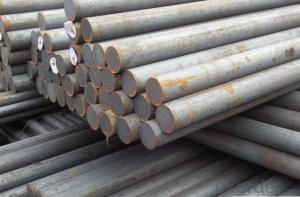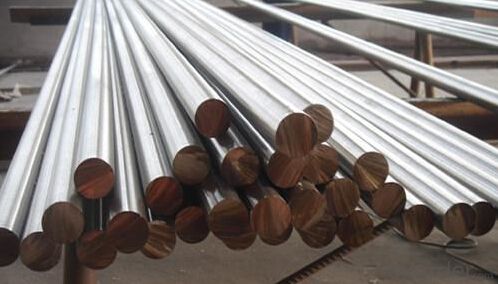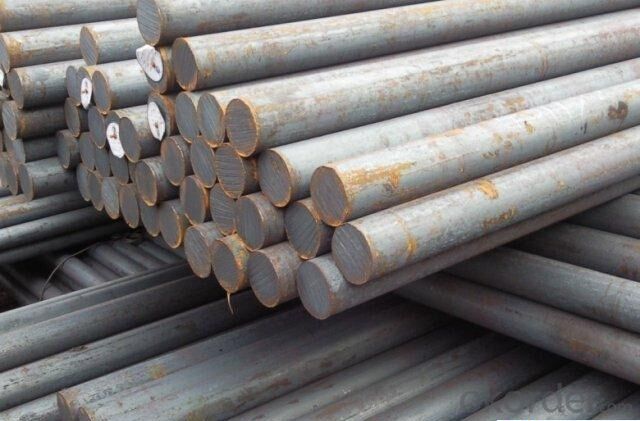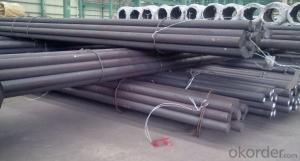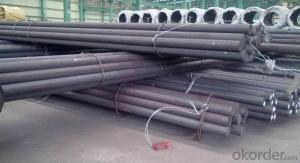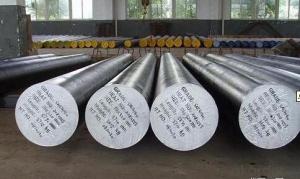Grade DIN35CrMo4 CNBM Alloy Steel Round Bar
- Loading Port:
- Shanghai
- Payment Terms:
- TT OR LC
- Min Order Qty:
- 25 m.t.
- Supply Capability:
- 10000 m.t./month
OKorder Service Pledge
OKorder Financial Service
You Might Also Like
Specification
Specifications:
1. Commodity: Alloy Steel Round Bar
2. Technical: Hot rolling
3. Length: Min. 5.8meter, according to requirement.
4.Diameter: 16mm-250mm
Chemical Composition:
Grade | C | Si | Mn | Cr | P | S | Ni | Cu | Mo |
35CrMo4 | 0.32-0.40 | 0.17-0.37 | 0.40-0.70 | 0.80-1.10 | ≤0.035 | ≤0.035 | ≤0.03 | ≤0.03 | 0.15-0.25 |
Mechanical Property:
Grade | Tensile Strengthσb (MPa) | Yield Strength | Elongation | Reduction of Area ψ (%) | Impact Akv(J) | Hardness |
σs (MPa) | δ5 (%) | |||||
35CrMo4 | ≥980(100) | ≥785(80) | ≥9 | ≥45 | ≥47 | ≤207HB |
Usage and Applications:
Gear, Sleevesspool,Shaft, Crankshaft, Pin
Packaging & Delivery:
Packaging Detail: Standard seaworthy packing or as customer required; all goods are packed in bundle with steel strips and shipped by break bulk vessel or container
Delivery Detail: 15~45 days
Production Flow:
EAF+LF+VD+ Forged+ Heat Treatment
Material prepare (billet) — heat up — rough rolling — precision rolling — cooling — packing — storage and transportation
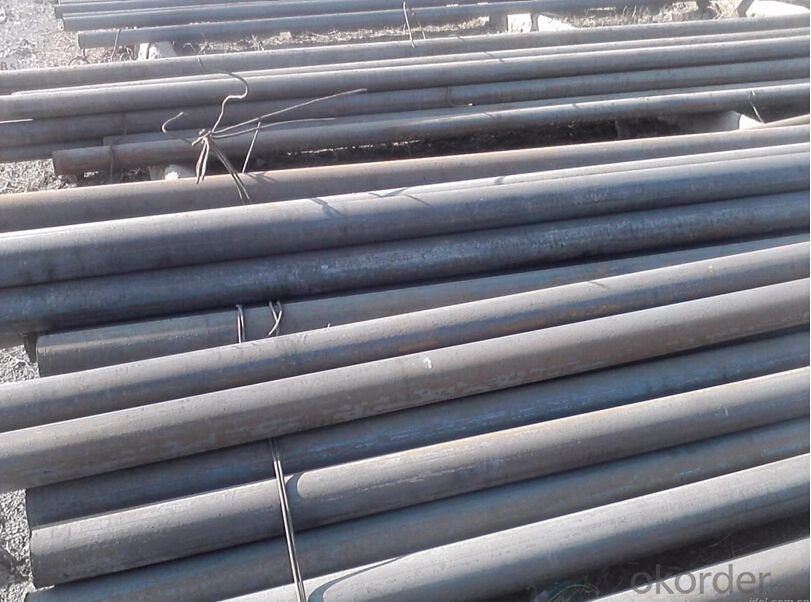
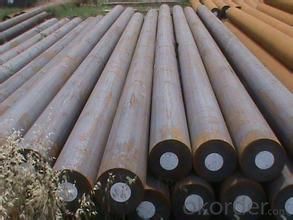
Quality Assurance:
1. We will strictly inspect our production that we sold according to the customer’s request.
2. Our steel reaches international quality standards.
3. Quality should be in conformity with the specification of the manufacturer. Quantity and packing conditions should be in conformity with the term in the contract.
4. Should the packing found damaged, the buyer has the right to claim to the seller
- Q: What are the properties of high-temperature tool steel?
- High-temperature tool steel possesses a combination of properties that make it suitable for use in high-temperature applications. It has excellent hardness, toughness, and wear resistance, enabling it to withstand extreme temperatures without losing its shape or strength. Additionally, it exhibits good thermal conductivity and dimensional stability, ensuring that it maintains its form and performance even under high heat and thermal cycling.
- Q: How are tungsten alloys used in the defense industry?
- Tungsten alloys are extensively used in the defense industry due to their exceptional strength, high density, and excellent resistance to heat and wear. These alloys are commonly utilized in the manufacturing of armor-piercing ammunition, artillery projectiles, and kinetic energy penetrators. Tungsten alloys are also employed in the production of various defense equipment such as missile components, bomb casings, and tank armor. Their ability to withstand extreme conditions and deliver superior performance makes them invaluable in enhancing the effectiveness and protection capabilities of military applications.
- Q: How does special steel contribute to the manufacturing of springs?
- Special steel contributes to the manufacturing of springs by providing specific mechanical properties that are crucial for their functionality. The unique composition and heat treatment of special steel ensure excellent strength, durability, and elasticity, allowing springs to efficiently store and release energy. Additionally, special steel's resistance to corrosion and fatigue enhances the lifespan and reliability of springs, making them suitable for various applications in industries such as automotive, aerospace, and machinery.
- Q: Can special steel be used in extreme weather conditions?
- Yes, special steel can be used in extreme weather conditions. Special steel is known for its excellent strength, durability, and corrosion resistance, making it a suitable material for various applications, including those in extreme weather conditions. For example, stainless steel, which is a type of special steel, is widely used in environments with high moisture or salt content, such as coastal areas or marine structures. It can withstand the corrosive effects of saltwater and resist rusting, making it ideal for prolonged exposure to extreme weather conditions. Additionally, special steel alloys can also be specifically designed to withstand extreme temperatures, such as those found in arctic or desert environments. These alloys can maintain their mechanical properties and structural integrity even in extreme cold or hot temperatures. Overall, special steel is a versatile material that can be utilized in various industries and applications, including those in extreme weather conditions, due to its exceptional strength, durability, and resistance to corrosion.
- Q: What are the different forging techniques for special steel?
- There are several different forging techniques used for special steel, including open die forging, closed die forging, and ring rolling. Open die forging involves shaping the steel between flat dies or anvils, while closed die forging uses shaped dies to compress the steel into the desired shape. Ring rolling involves shaping the steel by rolling it between two or more dies, creating a seamless ring shape. Each forging technique has its own advantages and is chosen based on the specific requirements of the steel product being produced.
- Q: What are the different methods of surface tumbling for special steel?
- There are several methods of surface tumbling that can be used for special steel. These methods include barrel tumbling, vibratory tumbling, and centrifugal tumbling. Barrel tumbling is a common method used for surface finishing of special steel. In this process, the steel parts are placed in a rotating barrel along with abrasive media. The barrel then rotates, causing the steel parts to tumble and come into contact with the abrasive media. This action helps to remove any burrs, sharp edges, or surface imperfections from the steel parts, resulting in a smoother and more polished surface finish. Vibratory tumbling is another method that can be used for surface tumbling of special steel. In this process, the steel parts are placed in a vibrating container along with abrasive media. The vibration causes the steel parts to move and come into contact with the abrasive media, effectively removing any surface imperfections. Vibratory tumbling is often preferred for delicate or complex-shaped steel parts, as it provides a gentler action compared to barrel tumbling. Centrifugal tumbling is a specialized method that utilizes centrifugal force to achieve surface tumbling of special steel. In this process, the steel parts are placed inside a rotating drum, which is then spun at a high speed. The centrifugal force causes the steel parts to move and come into contact with the abrasive media, resulting in the removal of any surface imperfections. Centrifugal tumbling is often used for smaller or more intricate steel parts, as it allows for precise control over the tumbling action. Overall, these different methods of surface tumbling provide various options for achieving the desired surface finish for special steel. The choice of method depends on factors such as the size, shape, and delicacy of the steel parts, as well as the desired level of surface finish.
- Q: How does special steel contribute to the efficiency of industrial equipment?
- Special steel contributes to the efficiency of industrial equipment in several ways. Firstly, special steel alloys have superior strength and hardness properties compared to regular steel, allowing for the construction of more durable and robust equipment. This increased strength helps to prevent wear and tear, reducing the need for frequent repairs or replacements, thereby improving the overall efficiency of the equipment. Furthermore, special steel alloys often exhibit excellent heat and corrosion resistance, making them ideal for applications in high-temperature or corrosive environments. This resistance to extreme conditions ensures that the equipment can operate reliably and efficiently in such challenging settings without compromising performance or safety. Special steel alloys also offer improved machinability, allowing for more precise and intricate manufacturing of industrial equipment components. This enhanced machinability ensures that the equipment is built to precise specifications, resulting in better overall performance and efficiency. Moreover, special steel alloys can be designed to possess specific characteristics, such as high conductivity or magnetic properties, making them ideal for applications where electrical conductivity or magnetism is required. This customization capability of special steel allows for the development of industrial equipment that is tailored to specific needs, maximizing efficiency and effectiveness. Overall, the use of special steel in industrial equipment significantly contributes to its efficiency by providing enhanced strength, durability, heat and corrosion resistance, improved machinability, and customization options. These properties not only increase the lifespan of the equipment but also improve its performance, reliability, and safety, ultimately leading to enhanced operational efficiency and productivity in industrial settings.
- Q: What are the requirements for special steel used in wind turbines?
- The requirements for special steel used in wind turbines typically include high strength and durability, resistance to corrosion and fatigue, excellent weldability, and good magnetic properties. Additionally, the steel should possess good formability and machinability to aid in the manufacturing process of turbine components.
- Q: Can special steel be used in the production of luxury goods?
- Certainly, luxury goods can certainly benefit from the use of special steel in their production. High-quality materials are often necessary to ensure the durability, exclusivity, and overall premium quality of luxury items. Special steels, such as stainless steel, alloy steel, or carbon steel, possess a variety of desirable properties that make them suitable for manufacturing luxury goods. For example, stainless steel is commonly utilized in the creation of luxury watches, jewelry, and accessories because of its resistance to corrosion, shiny appearance, and ability to endure daily wear and tear. Furthermore, certain alloy steels offer exceptional strength and toughness, making them perfect for luxury car components, high-end knives, or designer furniture. Incorporating special steel into luxury goods not only enhances their aesthetic appeal but also contributes to their longevity and value. These materials can be skillfully fashioned into intricate designs, enabling manufacturers to produce unique and exceptional products that cater to the discerning preferences of luxury consumers. All in all, special steel possesses a wide range of qualities that are highly sought after in the production of luxury goods, making it the preferred choice among designers and manufacturers in this industry.
- Q: How does special steel contribute to reducing product waste during manufacturing?
- Special steel contributes to reducing product waste during manufacturing by offering enhanced properties such as durability, strength, and corrosion resistance. This allows manufacturers to produce longer-lasting and more reliable products. By using special steel, companies can reduce the need for frequent replacements, repairs, or discarded products due to wear and tear. This not only minimizes material waste but also reduces the environmental impact associated with manufacturing processes.
Send your message to us
Grade DIN35CrMo4 CNBM Alloy Steel Round Bar
- Loading Port:
- Shanghai
- Payment Terms:
- TT OR LC
- Min Order Qty:
- 25 m.t.
- Supply Capability:
- 10000 m.t./month
OKorder Service Pledge
OKorder Financial Service
Similar products
Hot products
Hot Searches
Related keywords

